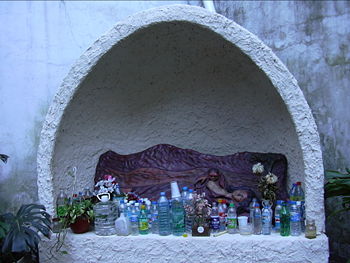Folk saint: Difference between revisions
Jump to navigation
Jump to search


imported>Daniel Mietchen (intro) |
imported>Daniel Mietchen (<includeonly>) |
||
| Line 1: | Line 1: | ||
<noinclude>{{subpages}}</noinclude> | <noinclude>{{subpages}}</noinclude> | ||
<onlyinclude>{{Image|Difunta Correa.jpg|right| | {{Image|Difunta Correa.jpg|right|350px|Bottles of water are offered to the folk saint [[Difunta Correa]] in commemoration of her death by thirst.}} | ||
<onlyinclude><includeonly>{{Image|Difunta Correa.jpg|right|150px|Bottles of water are offered to the folk saint [[Difunta Correa]] in commemoration of her death by thirst.}}<includeonly> | |||
'''[[Folk saints]]''' are dead people or presumed spiritually powerful entities (such as indigenous spirits) venerated as [[saint]]s but not officially [[canonization|canonized]]. Since they are saints of the "folk," or the ''populus'', they are also called '''popular saints'''. Like officially recognized saints, folk saints are considered [[intersession|intercessors]] with [[God]], but unlike their official counterparts many are also understood to act directly in the lives of their devotees. | '''[[Folk saints]]''' are dead people or presumed spiritually powerful entities (such as indigenous spirits) venerated as [[saint]]s but not officially [[canonization|canonized]]. Since they are saints of the "folk," or the ''populus'', they are also called '''popular saints'''. Like officially recognized saints, folk saints are considered [[intersession|intercessors]] with [[God]], but unlike their official counterparts many are also understood to act directly in the lives of their devotees. | ||
Revision as of 05:54, 1 April 2010

(CC) Photo: Manuel Carlos Villalba
Bottles of water are offered to the folk saint Difunta Correa in commemoration of her death by thirst.
Bottles of water are offered to the folk saint Difunta Correa in commemoration of her death by thirst.